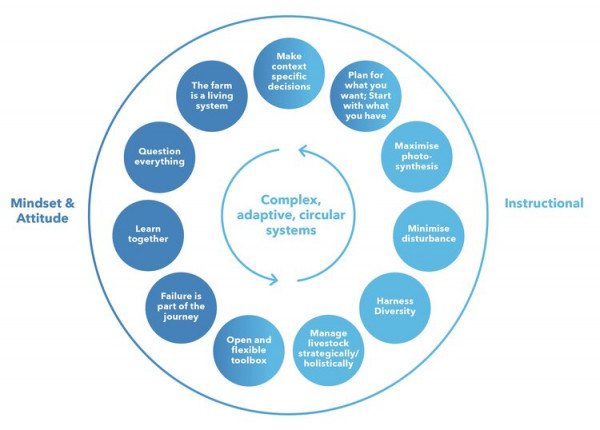What’s the Deal with Regenerative Agriculture?
in Sustainability Assurance
Author: Simon Love
6785
If you follow farming news, you’ve likely come across the term Regenerative Agriculture (often shortened to Regen Ag or RA) in the past year.
Depending on your news source, it may have been described as the future of farming, something our farmers already do or a wishy-washy concept without scientific merit.
So what’s the truth?
What is Regenerative Agriculture?
There is no internationally-agreed definition of Regenerative Agriculture (RA), and it’s also very difficult to standardise. While some RA standards exist, it can actually encompass a range of practices and attributes. RA practices can include everything from mainstream responsible farming practices to more ‘out there’ practices like biodynamic farming.
Critically, there is no New Zealand-specific standard.
Large overseas corporations, such as Nestlé and Danone, have committed to supporting RA. However, international definitions of RA won’t necessarily work here in New Zealand, for several reasons:
- Farming systems in Europe and the USA tend to differ wildly from our extensive, pasture-based systems.
- The environmental issues faced in those countries are different to the ones we face in New Zealand.
- We have the unique integration of Te Ao Māori (the Māori worldview) into our agricultural systems.
Attempts to define Regenerative Agriculture in Aotearoa
The closest we’ve come to defining what RA means in a local context is in a recent white paper(external link) . It was published by Gwen Grelet of Manaaki Whenua Landcare Research(external link) and Sam Lang of Quorum Sense(external link) (an organisation that brings together farmers to share knowledge of RA practices).
In this paper, RA is described as “outcomes-focused and principles-led”:
- Outcomes refers to aspects of soil health, biodiversity, water quality, animal health and farmer wellbeing, to name a few.
- The 11 principles the paper defines, as shown in the figure below, combine simple instructional principles (e.g. “minimise [soil] disturbance”) with aspects of mindset, including the intriguing: “question everything”.

The 11 principles of Regenerative Agriculture as given in Grelet & Lang, et al. (2021)
Arguments for and against Regenerative Agriculture
Supporters of RA are often very enthusiastic, claiming that not only is it equally (or more) profitable, but has restored their relationship with the land, leaving them happier and healthier.
Detractors would say that there is a lack of scientific research into these practices, and that there is no way a farm could function without replenishing the nutrients that leave in the form of products. The inclusion of concepts with pseudoscientific roots such as biodynamics also does not help with the image of RA amongst more conventional farmers and farm managers.
Why is there resistance to Regenerative Agriculture in New Zealand?
Initial resistance perhaps comes from the implication that if your farm isn’t regenerative, it is degenerative – in other words, degrading the land and water.
However, the main reason there is resistance to RA is that it largely goes against the last 50 or so years of research and practice in farming in New Zealand. Modern livestock farms are very good at growing a lot of grass, often through the application of fertiliser and irrigation.
RA turns this on its head by introducing multi-species pastures, no-till, minimal fertiliser application, and a range of practices that focus on maximising soil health over pure output.
This clash between RA’s almost evangelical supporters and notoriously sceptical farming communities is something that will likely continue.
Regenerative Agriculture vs Organic Certification
Organic certification is a robust and recognised term, and is largely focused on farming practices and inputs that have been tried and tested over many years.
Advocates of organic certification believe it is already the gold standard of responsible farming, and that few gains could be made from introducing RA as something different.
On the flip side, advocates of RA would counter that by arguing that organic certification:
- focuses more on inputs than outcomes;
- is less flexible than RA; and
- doesn’t focus as strongly on building long-term soil health.
What’s next for Regenerative Agriculture in New Zealand?
Despite the absence of local agreed definitions or standards for RA, some companies have decided to press ahead.
Quorum Sense and Calm the Farm(external link) are encouraging farmers to integrate RA principles into their systems to improve soils and build resilience to climate change. The new ZQRX programme from New Zealand Merino(external link) was developed to tell the stories of farmers going above and beyond existing assurance programmes. The momentum only seems to be building.
Clearly, consumers like the concept of RA and are ready to embrace it right now, so what’s next for RA here in New Zealand?
We can expect to see continued growth in this area, with significant amounts of government funding being directed to RA research. If the benefits are proven to match any of the anecdotal evidence so far, then we can expect more RA principles and practices to be integrated into commercial farming systems in the near future.